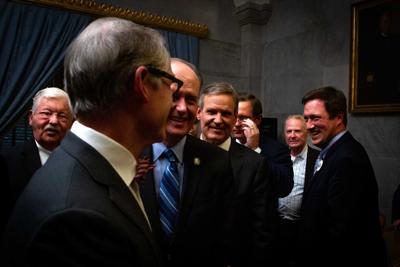
Gov. Bill Lee and other Republican leaders celebrate the passage of school voucher legislation with voucher supporters inside the Capitol, Jan. 30, 2025
Kick-starting this year’s events at the legislature was a special session pushed by Gov. Bill Lee. The brief session, which concluded in late January, focused on strict immigration measures and hurricane relief for East Tennessee. But one main objective remained at the forefront — creating a school voucher program, an effort that failed in the Tennessee General Assembly last year.
The Republican supermajority was successful in passing the Education Freedom Act in a mere four days, but a notable number of state Republicans — 21 House lawmakers and seven in the Senate — voted against the legislation. The $400 million-plus act created a K-12 school voucher program allowing for the use of public dollars to go toward private schools.
With Republicans promoting the need for what they call school choice, the program establishes 20,000 scholarships at about $7,000 each to go toward private school tuition and other educational expenses. Half of the scholarships will be awarded based on financial need, while the other 10,000 will be available to all students regardless of their family’s income. Also included in the act was a $2,000 bonus for teachers and an allocation of 80 percent of sports betting tax collections to be put toward school infrastructure funding.
Controversial legislation costs nearly half of $910 million budget passed for governor’s priorities
Coldly referring to the program as the “voucher scam,” state Democrats assert that the program will deplete funding from public schools, which receive money from the state based on the Tennessee Investment in Student Achievement formula (TISA). The formula partially allocates money depending on how many students are in a school district. The legislation’s fiscal note anticipates adding $3.3 million to the TISA fund in its first year but says the following years are expected to see a decrease in funding by at least $44.9 million.
Several bills altering the way TISA weighs its allocations did not advance in this year’s session. One bill would have allowed local school boards to provide real-time enrollment data so TISA funding could be adjusted throughout the year.
Student applications for the scholarship program are set to open on May 15, and a majority of the state’s eligible private schools have said they intend to participate. Twenty-seven private schools in Davidson County have registered as of this writing.
Alexander-sponsored legislation now moves to Senate for consideration
Cellphone Restrictions
Another major piece of education policy that has been signed by the governor: a law that will restrict the use of cellphones by students in public schools. Beginning in the 2025-26 school year, the ban will require local boards of education and public charter schools to adopt policies that prohibit students from using wireless communication devices during instructional time.
The law defines wireless communication devices as a “a portable wireless device that has the capability to provide voice, messaging or other data communication between two or more parties.” That can include cellphones, tablet computers, laptops, smartwatches and gaming devices. The legislation also allows teachers to withhold the devices if doing so is outlined in their district’s policies and gives local school boards choice in their disciplinary policy for students who break the device restrictions.
Certain exceptions can be made when it comes to the use of devices in the classroom — for instance, in the case of emergencies, if a teacher allows it for educational purposes, to manage a student’s health, or if the device is included in a student’s individualized education program or Section 504 plan (tools that assist students with disabilities).
School Curriculum
Two bills relating to family-life instruction have been signed by the governor. One received support from both Democrats and Republicans and will add instruction on Tennessee’s safe-haven law — which allows parents of newborns to surrender babies at designated facilities without being prosecuted — into the curriculum for high school students.
The other piece of family-life curriculum passed along party lines. It will teach students the “positive and personal societal outcomes” of earning a high school diploma, entering into the workforce or higher education, getting married and having children — in that order.
The Teen Social Media and Internet Safety Act received bipartisan support in both chambers and requires the state Department of Education to create a curriculum on the instruction of social media and internet safety for middle and high school students. The curriculum will include education on time management and healthy behaviors on social media, the distribution of information online and the evaluation of AI-generated content.
The good, the bad and the ugly from the 2025 session of the Tennessee General Assembly








